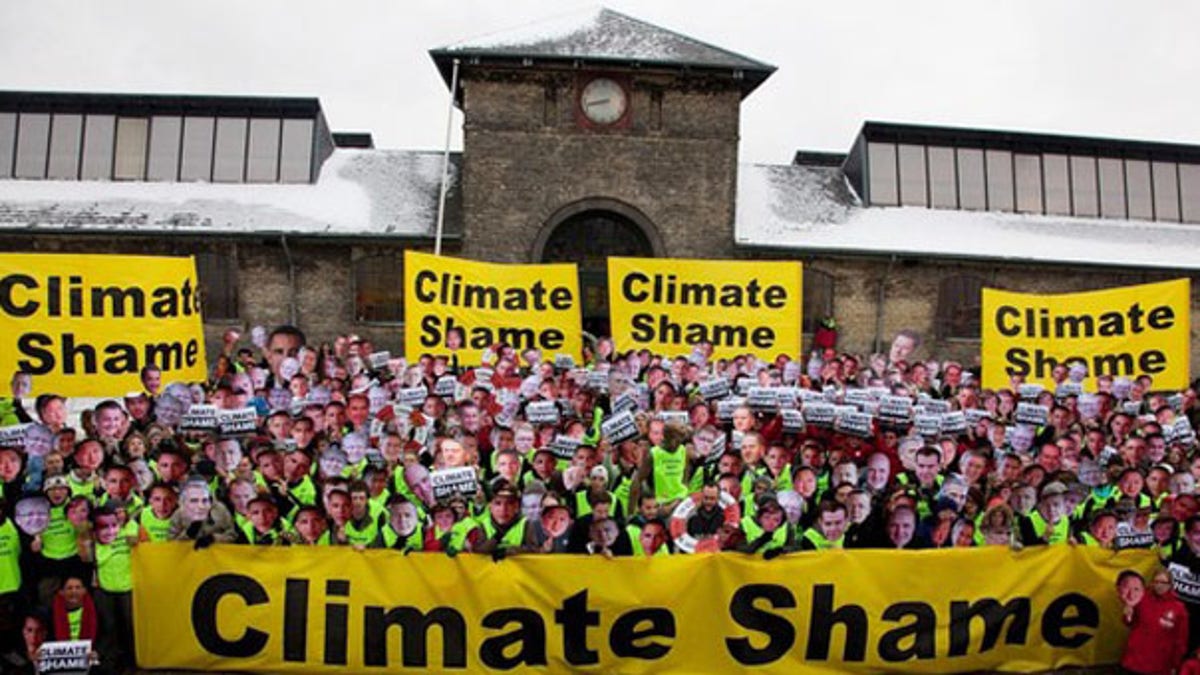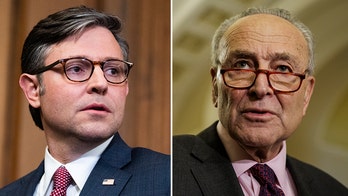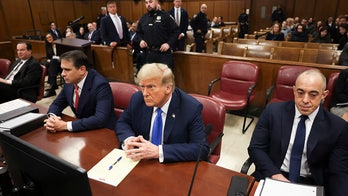
A handout shows members of the TckTckTck coalition protesting the heads of state at the Climate Change Conference in Copenhagen Dec. 18. (Reuters Photo)
The chaotic conclusion of the two-week international conference on climate change could imperil, or at least water down, climate legislation stuck in the U.S. Senate.
Sen. John Kerry, D-Mass., warned about that possibility two days ago when he first arrived in Copenhagen, saying that without a solid deal it would be "exceedingly difficult" to persuade fence-sitting lawmakers to get on board with the kind of emissions-curbing legislation that passed the House months ago.
Copenhagen didn't make that task any easier, observers said. The Obama administration announced a "meaningful agreement" late Friday following a marathon day of talks, but the deal is non-binding and far from the comprehensive agreement sought by Obama and other leaders. And with China resisting the kind of verification standards the United States was pushing for, concerns linger that China would not be making a shared sacrifice and that U.S. reductions would be meaningless without enforceable cuts from the developing world.
Add to that the fact that the Senate would be considering the so-called "cap-and-trade" climate bill during an election year and at a time when lawmakers are set to tackle sweeping financial industry regulation. The stomach for advancing legislation that critics call "cap-and-tax" might not be there, even though leading Democrats have been pressing the Senate to take action once health care reform is dealt with.
President Obama was visibly frustrated as he addressed the conference earlier Friday.
"As the world watches us today, I think our ability to take collective action is in doubt right now, and it hangs in the balance," Obama said. After announcing the "breakthrough," he conceded that progress toward a binding deal would "take some time."
William Yeatman, energy policy analyst with the Competitive Enterprise Institute, said the Denmark conference will unquestionably be a "boost" to opponents of the climate legislation and a ready excuse for moderates unsure about the package in the first place.
"It makes it easier for certain senators to say, 'Well if this can't occur globally, why should this proceed domestically?'" Yeatman said. "Absent a multilateral treaty, unilateral action is futile."
But with world leaders set to meet again next year, Kerry said in a written statement released late Friday that Copenhagen "can be a catalyzing moment" for the U.S. Congress.
"President Obama's hands-on engagement broke through the bickering and sets the stage for a final deal and for Senate passage this spring of major legislation at home," Kerry said. "With this in hand, we can work to pass domestic legislation early next year to bring us across the finish line."
GOP lawmakers have long declared that the cap-and-trade bill that passed the House has no future in the Senate. That view was strengthened in light of Copenhagen, with representatives attending the conference continuing to warn about the economic damage they say the bill would do.
It will be "difficult to get 60 votes needed in the Senate to pass it," Rep. James Sensenbrenner, R-Wis., said.
Sen. James Inhofe, R-Okla., the leading global warming skeptic in the Senate who declared Thursday in Denmark that the climate bill would not pass, said Friday that Obama's goal of cutting emissions by 17 percent from 2005 levels by 2020 faces "significant bipartisan opposition in the Senate."
Sen. Lamar Alexander, R-Tenn., the No. 3 Senate Republican and member of the Environment and Public Works Committee, said Copenhagen certainly didn't make it any more likely that such a program would win support in the Senate.
"I think the prospects for an economy-wide cap-and-trade are poor next year," he told FoxNews.com.
But key senators have been trying to work up the framework for a new version of climate change legislation that can attract broader support. Sen. Lindsey Graham, R-S.C.; Sen. Joe Lieberman, I-Conn., and Kerry have been at the helm of that effort. It's not clear whether that bill would include the kind of cap-and-trade system approved on the House side -- that system would set a cap on emissions for U.S. companies, but allow those that pollute more to buy credits from those that pollute less.
Alexander said the Kerry-Graham-Lieberman effort is a "good beginning" so long as it steers away from a cap-and-trade system. He said the United States can still take the lead on alternative energy research, only with a less-sweeping, lower-cost energy bill.
Alaska Sen. Lisa Murkowski said in a written statement that whatever legislation is considered next year must be sensitive to the economy. The ranking Republican on the Senate Energy and Natural Resources Committee touted a more "incremental" bill out of her panel.
"The state of negotiations in Copenhagen reflect the difficulty of finding agreement on climate change in the face of a major global economic recession," Murkowski said. "But addressing environmental concerns in a way that endangers the economy is a non-starter at this point."



